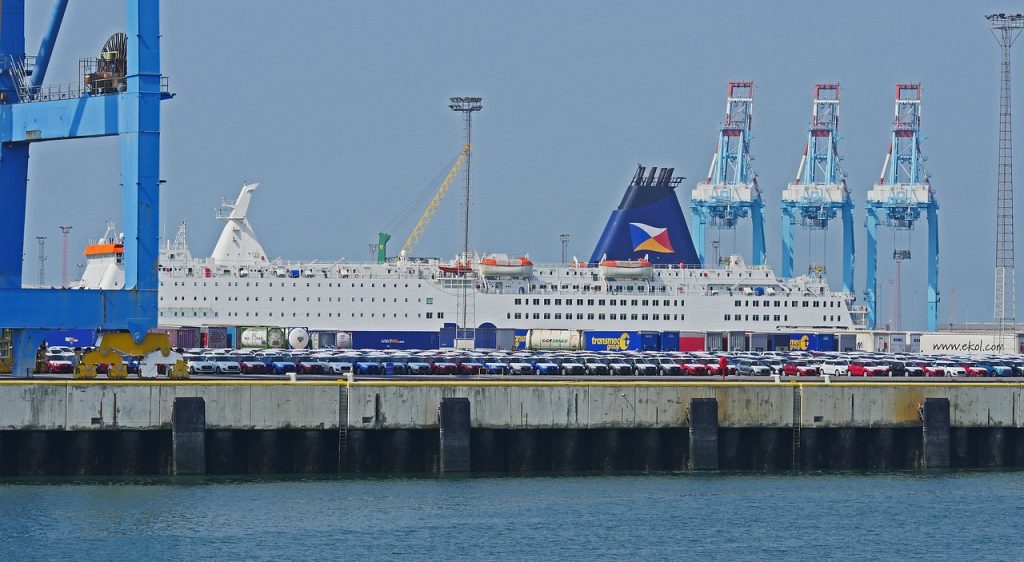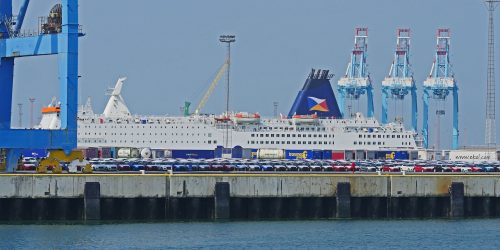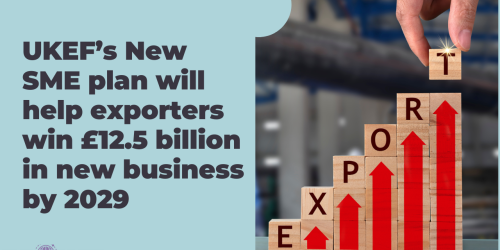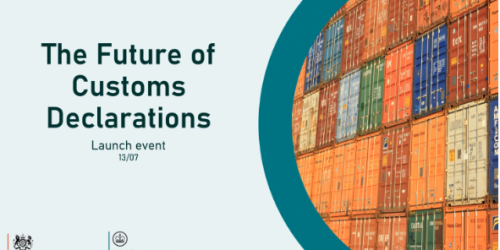10 UK Export News You Might’ve Missed – Week 9

In this edition of Export News from Expordite, we’ll cover the top 10 UK export news and headlines from week 9 of 2024 – February 26th-March 3rd, 2024.
Key News:
Export News:
1. SCALE OF RED SEA DISRUPTION REVEALED
“New research by the BCC’s Insights Unit has uncovered the scale of the impact on UK businesses caused by the disruption to shipping in the Red Sea.
Almost two fifths (37%) of more than 1,000 firms surveyed overall for the research said they had been impacted – with exporters, manufacturers and B2C businesses (which include retailers and wholesalers) far more likely to report an impact.
The issues cited by firms included increased costs, with some reporting rises of 300% for container hire, and logistical delays, adding up to three to four weeks to delivery times. Firms also said this was creating knock-on effects such as cashflow difficulties and component shortages on production lines. “
Source: BCC
2. UK announces new support to boost British exports and investment in the Western Balkans
“At the European Bank for Reconstruction and Development Western Balkans investment summit in London today (Monday 26 February), the UK will outline a package of energy and infrastructure support to boost trade and drive investment between the UK and the Western Balkans, creating jobs and supporting livelihoods across the countries.
As the region looks to decarbonise, the UK will commit additional funding of £4.2 million to accelerate the transition away from coal and develop wind power to support many of the countries in the region to end dependence on Russian energy supplies, building on the £1.1 million provided last year for energy security through partners including the World Bank. “
Source: GOV.uk
3. UK Export Finance appoints new Chairman of the Board
“On 1 March 2024, Robert Gillespie succeeds Noël Harwerth as Chairman of the UK Export Finance (UKEF) Board.
His role will also see him acting as a Non-Executive member of the Department for Business and Trade Board.
As a member of the Board, Robert will support the department’s Chief Executive Officer and Ministers in developing UKEF’s strategy and overseeing its operations.“
Source: GOV.uk
4. Eco-chic skiwear company hits new slopes with £1.4m UK government deal
“British skiwear disruptors OOSC Clothing are set for global expansion with a government deal which secures them a £1.4 million export finance package.
OOSC was started by two friends from Swansea University and now exports to over 110 countries from their regional websites including sales to 49 separate US states. UK Export Finance has supported HSBC UK in financing OOSC to continue ramping up sales in key markets like the EU, USA, Canada, Australia and New Zealand.
Supported by this latest deal with UKEF, the company will be able to fulfil more international orders from major retailers like ASOS and Decathlon. Following on from the previous £450k HSBC UK facility which UKEF supported in 2021, the new financing will also help OOSC to purchase more inventory to support their growth in global sales. In 2023, OOSC also secured a green trade loan from HSBC thanks in part to their sustainability credentials.“
Source: GOV.uk
5. UK trade in goods, year in review: 2023
“The value of total goods imports decreased by £52.2 billion (8.2%) in 2023 compared with 2022, and total goods exports fell by £17.4 billion (4.4%), primarily because of falling imports and exports of fuels.
Imports and exports have increased in value terms since 2018, however, recent volatile price inflation has had a substantial impact on trade; after adjusting for inflation, the UK imported and exported less in 2023 than in 2018.
The value of total goods exports decreased by £17.4 billion (4.4%) when compared with 2022, however they increased by £23.7 billion (6.7%) when compared with 2018. Exports to both EU and non-EU countries fell throughout 2023, with EU exports falling by £11.5 billion and non-EU exports by £5.9 billion.“
Source: ONS
6. Britain’s post-Brexit trade patterns are finally emerging in the data
“The impact of Brexit on trade in the first two years after leaving the EU was complicated by global events: first the pandemic, and then the spike in energy prices. This means the 2023 data – the third year of trade post-Brexit – is the first real opportunity to see what’s going on.
At first glance, the UK’s 2023 trade performance is exactly what you might expect from an economy adapting to new trade barriers – losing momentum like a tire with a ‘slow puncture’. After a more sluggish pandemic revival than our G7 peers, British trade excluding precious metals has since been essentially flat, falling 0.2 per cent between 2022 and 2023. Depressingly, this leaves trade openness (imports and exports relative to GDP) below its 2019 levels by the end of 2023 (3 percentage points below) – while France, with its similar trade profile, was 0.4 percentage points above. Even the US, in the midst of a trade war with China, has seen openness rise by 0.1 percentage points between 2019 and 2023.
The impact of Brexit is most obvious in UK goods trade. By the end of 2023, goods trade had shrunk to levels not seen since 2015. This isn’t just part of a general slowing of goods trade around the world – the UK’s goods exports and imports have contracted by 13.2 per cent and 7.4 per cent since 2019, by far more than any other G7 country.”
Source: Resolution Foundation
7. Sheep meat demand surge drives up UK exports by 11.7%
“Strong demand for UK lamb on international markets bolstered red meat exports in 2023 to the tune of £1.7bn.
Full year figures from HMRC show that in 2023, red meat exports, including offal, achieved a similar level in value to the record year of 2022, backed up by the performance of exports of sheep meat, particularly to the EU.
The total value of red meat shipments to the EU during the period was up 2% on the year at £1.3bn while volumes fell by 12% on the year.
Within this figure, sheep meat exports to France – the UK’s largest market – increasing by 23% in value to £292m and 23% in volume on the year to 45,000t. Elsewhere shipments to Germany were up by 15% to £108m and in volume by 12%. The overall value of sheep meat exports, increased by 11.7% to £562m.“
Source: The Scottish Farmer
8. Food trade bodies consider legal action over post-Brexit ‘not for EU’ labelling
“Food industry trade bodies are discussing whether to take legal action against the government over post-Brexit plans that will require all meat and dairy products sold in the UK to be labelled as “not for EU”.
Food producers say the labelling could add £250m a year to their costs, further fuelling inflation, and they are discussing a legal challenge as a viable option if a solution with the government is not found.“
Source: The Guardian
9. CCS-UK makes the move to new customs system
“UK electronic air cargo community system, CCS-UK said it has migrated to HM Revenue and Customs’ (HMRC) new platform, CDS (Customs Declaration Service).
Users can now submit declarations through CCS-UK for all air imports and exports to the new system, which is due to replace HMRC’s 1980s-vintage CHIEF (Customs Handling of Import and Export Freight) system by the end of the year.”
Source: Air Cargo News
10. UK businesses welcome protection for iconic British food and drink in Japan
“Today [27 February] Japan and the UK will complete the process to grant special protected status to iconic British food and drink products including Cornish Pasties and Anglesey Sea Salt to safeguard against imitation.
Businesses have welcomed the news that 37 Geographical Indications (GIs) will formally gain protection on Thursday [29 February] following the completion of UK and Japanese scrutiny processes. A second group of protections is set to be announced once further work has concluded.
Securing GIs for iconic British products such as Melton Mowbray Pork Pies, Welsh Beef and Staffordshire Cheese prevents counterfeit products being placed on the Japanese market, ensuring UK businesses can export with confidence and consumers receive authentic, high-quality products. “
Source: GOV.uk
Want to get more international trade content straight to your inbox?






